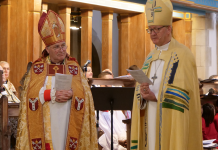Civil Partnerships – for same sex and opposite sex and opposite sex couples.
A pastoral statement from the House of Bishops of the Church of England
- In December 2005 the Civil Partnership Act came into force. For the first time it created a new institution that was not marriage, enabling two people of the same sex to acquire a new legal status by registering a civil partnership with each other. The House of Bishops prepared a statement in July 2005 to help the Church as it addressed the pastoral and other implications of the new legislation.
- At the time, Civil Partnerships were possible only for couples of the same sex. The government of the day had no intention of introducing same sex marriage, and so civil partnerships were offered as a complementary but distinct institution: marriage for opposite sex couples and civil partnerships for same sex couples.
- However, things changed with the introduction of same sex marriage by the Coalition government in 2013. This, for the first time, meant that a substantive gap emerged between the Church’s understanding of marriage and that of the State. The House of Bishops has issued separate guidance on same sex marriage (2014).
- In June 2018, the Supreme Court ruled that the retention in law of Civil Partnerships solely for same-sex couples was incompatible with the Human Rights Convention. HMG has chosen to respond to this by making provision for Civil Partnerships to be opened to opposite sex couples.
- HMG supported a Private Member’s Bill which included provision for the Civil Partnership Act 2004 to be amended by regulations to allow opposite sex couples to enter Civil Partnerships. The Bill received Royal Assent on 26th March 2019, becoming the Civil Partnerships, Marriages and Deaths (Registration Etc.) Act 2019.
- The House of Bishops is therefore issuing this new Pastoral Statement on Civil Partnerships to reflect the fact that Civil Partnerships are now open to both same-sex and opposite-sex couples. It also addresses other changes in marriage law since 2005.
The Church’s Teaching on Marriage
- It has always been the position of the Church of England that marriage is a creation ordinance, a gift of God in creation and a means of his grace. Marriage, defined as a faithful, committed, permanent and legally sanctioned relationship between a man and a woman making a public commitment to each other, is central to the stability and health of human society. We believe that it continues to provide the best context for the raising of children, although it is not the only context that can be of benefit to children, especially where the alternative may be long periods in institutional care.
- The Church of England’s teaching is classically summarised in The Book of Common Prayer, where the marriage service lists the causes for which marriage was ordained, namely: ‘for the procreation of children, …for a remedy against sin [and]…. for the mutual society, help, and comfort that the one ought to have of the other.’
- In the light of this understanding the Church of England teaches that “sexual intercourse, as an expression of faithful intimacy, properly belongs within marriage exclusively” (Marriage: a teaching document of the House of Bishops, 1999). Sexual relationships outside heterosexual marriage are regarded as falling short of God’s purposes for human beings.
- The introduction of same sex marriage, through the Marriage (Same Sex Couples) Act 2013, has not changed the church’s teaching on marriage or same sex relationships. A major study of this and other areas of human sexuality is underway (the Living in Love and Faith project). This work, which is expected to be completed in 2020, will then inform further deliberations of the House of Bishops. In the context, however, of the introduction of opposite sex as well as same sex civil partnerships, the teaching of the church on marriage remains unchanged.
The effect of legislation introducing civil partnerships
- Two people may form a civil partnership by signing a civil partnership document in the presence of each other, a civil partnership registrar, and two witnesses. The legislation underlines the civil nature of the registration by providing that it may not take place on religious premises nor include a religious ceremony.
- Many of the provisions in the legislation on civil partnerships are, however, similar to, or identical with, those in marriage law. In particular, couples may not register if they are under 16 (or under 18 and do not have parental consent), are within one of the prohibited degrees of relationship, or already have a civil partnership or are married.
- As with marriage, civil partnerships embody the concept of committed fidelity between two persons, mutually consenting to their relationship.
- The legislation does, however, leave entirely open the nature of the commitment that members of a couple choose to make to each other when forming a civil partnership. In particular, it is not predicated on the intention to engage in a sexual relationship. Thus, there is no equivalent of the marriage law provision either for annulment on grounds of non-consummation or for its dissolution on the grounds of sexual infidelity.
- Behaviour such that one party ‘cannot reasonably be expected to live with’ the other can trigger the dissolution of a civil partnership. Whether sexual conduct was relevant would depend on the circumstances of each case and the nature of the understandings reached between the couple when entering into the partnership. There is likely to be a range of circumstances in which people of the same sex or opposite sex choose to register a partnership, including some where there is no intention for the relationship to be expressed through sexual activity.
- The principles underlying the pastoral guidance which the House of Bishops issued following the Civil Partnership Act 2003 therefore apply also to opposite sex civil partnerships.
The blessing of civil partnerships
- It is likely that some who register civil partnerships – whether same sex or opposite sex — will seek some recognition of their new situation and pastoral support by asking members of the clergy to provide a blessing for them in the context of an act of worship.
- The House advised in 2005 that the practice of the Church of England needs to reflect the pastoral letter from the Primates of the Anglican Communion at Pentecost 2003 which said: ‘The question of public rites for the blessing of same sex unions is still a cause of potentially divisive controversy. The Archbishop of Canterbury spoke for us all when he said that it is through liturgy that we express what we believe, and that there is no theological consensus about same sex unions. Therefore, we as a body cannot support the authorisation of such rites’.
- Because of the ambiguity about the place of sexual activity within civil partnerships of both sorts, and the church’s teaching that marriage between a man and a woman is the proper context for sexual intercourse, we do not believe that it is possible for the church unconditionally to accept civil partnerships as unequivocally reflecting the teaching of the church.
- One consequence of the ambiguity contained within the civil partnerships legislation is that people in a variety of relationships will be eligible to register as civil partners, some living consistently with the teaching of the Church, others not. In these circumstances, the House continues to believe that it would not be right to produce an authorised public liturgy in connection with the registering of civil partnerships. In addition, the House of Bishops affirms that clergy of the Church of England should not provide services of blessing for those who register a civil partnership.
- It will be important, however, to bear in mind that registered partnerships do allow for a range of different situations – including those where the relationship is simply one of friendship. Hence, clergy need to have regard to the teaching of the church on sexual morality, celibacy, and the positive value of committed friendships in the Christian tradition. Where clergy are approached by people asking for prayer in relation to entering into a civil partnership they should respond pastorally and sensitively in the light of the circumstances of each case.
Those wishing to be in ordained ministry and to register a civil partnership
- The House of Bishops does not regard entering into a civil partnership as intrinsically incompatible with holy orders, provided the person concerned is willing to give assurances to his or her bishop that the relationship – whether same sex or opposite sex – is consistent with the standards for the clergy set out in Issues in Human Sexuality. The wording of the Act means that civil partnerships will be likely to include some whose relationships are faithful to the declared position of the Church on sexual relationships.
- The Church should not collude with the present assumptions of society that all close relationships necessarily include sexual activity. The House of Bishops considers it would be a matter of social injustice to exclude from ministry those who are faithful to the teaching of the Church, and who decide to register a civil partnership. There can be no grounds for terminating the ministry of those who are loyal to the discipline of the Church.
- Nevertheless, it would be inconsistent with the teaching of the Church for the public character of the commitment expressed in a civil partnership to be regarded as of no consequence in relation to someone in – or seeking to enter – the ordained ministry. Members of the clergy and candidates for ordination who decide to enter into civil partnerships must expect to be asked for assurances that their relationship will be consistent with the teaching set out in Issues in Human Sexuality.
- While clergy are fully entitled to argue, in the Living in Love and Faith process and elsewhere, for a change in that teaching, they are not entitled to claim the liberty to set it aside. Because of the ambiguities surrounding the character and public nature of civil partnerships, the House of Bishops advise clergy to weigh carefully the perceptions and assumptions which would inevitably accompany a decision to register such a relationship.
- Although there is nothing in the legislation for Opposite Sex Civil Partnerships which determines their social meaning, the arguments advanced in the Supreme Court included the desire for a publicly authorised institution which explicitly rejected the perceived religious connotations of marriage. Given this ambiguity, clergy and candidates for ordination wishing to enter an Opposite Sex Civil Partnership should expect to be asked to explain their understanding of the theological and social meanings of their decision.
- Once opposite sex civil partnerships have been available for some time, the situation may arise where a candidate for ordination (or consecration) has been in a civil partnership that has ended and is now married. The question then arises whether the provisions of Canon C4, seeking to establish the circumstances in which the previous relationship broke up, apply.
- As a civil partnership is not entered into through vows, the question of broken vows does not arise in the case of a former civil partnership. As Canon C4 is primarily concerned to give assurance that the candidate fully understands the nature of vows and the spiritual implications of breaking them, Canon C4 does not apply in the case of a broken civil partnership. However, civil partnerships do involve commitment to another person and the discernment process for ordination or consecration involves seeking assurances about the whole character of a candidate as revealed in the history of their relationships of different kinds. If a candidate has a broken civil partnership in their history, they should expect to be asked to give an account of the causes of the breakdown of this relationship.
Lay people who register civil partnerships
- The House considers that lay people who have registered civil partnerships ought not to be asked to give assurances about the nature of their relationship before being admitted to baptism, confirmation and communion.
- In relation to infant baptism, Canon B 22.4 makes it clear that, while baptism can be delayed for the purposes of instruction (including on marriage and the family), it cannot be refused. The responsibility for taking vows on behalf of the infant rests with the parents and godparents. Provided there is a willingness, following a period of instruction, to give those vows, priests cannot refuse to baptise simply because those caring for the infant are not, in their view, living in accordance with the Church’s teaching.
Converting Marriages to Civil Partnerships
- The legislation on Opposite Sex Civil Partnerships has not, to date, made provision for those who are currently married to convert their marriage into a civil partnership. This question is expected to be considered, and possibly legislated for, later in 2020. If provision for conversion from a marriage to a civil partnership is made possible, it may be for a limited period only. If such provision is made, the following considerations should shape to the church’s pastoral practice.
- A key difference between a marriage and a civil partnership is that marriages are solemnised with vows and civil partnerships are not. Converting a marriage into a civil partnership thus implies the repudiation of a couple’s marriage vows.
- If a couple decides to convert their marriage to a civil partnership and seeks to discuss this in a church context, good pastoral practice requires that their reasons are carefully attended to. But the implication that they are repudiating their marriage vows should be carefully pointed out to them.
- In the case of clergy or ordinands who seek to convert a marriage into a civil partnership, it should be made clear to them that their decision involves the repudiation of their marriage vows and that the same discipline will apply to them as to those who have broken their marriage vows in other circumstances.
Conclusion
- With opposite sex civil partnerships, and with those for same sex couples, the Church’s teaching on sexual ethics remains unchanged. For Christians, marriage – that is the lifelong union between a man and a woman, contracted with the making of vows – remains the proper context for sexual activity. In its approach to civil partnerships the Church seeks to uphold that standard, to affirm the value of committed, sexually abstinent friendships and to minister sensitively and pastorally to those Christians who conscientiously decide to order their lives differently.
House of Bishops
December 2019










